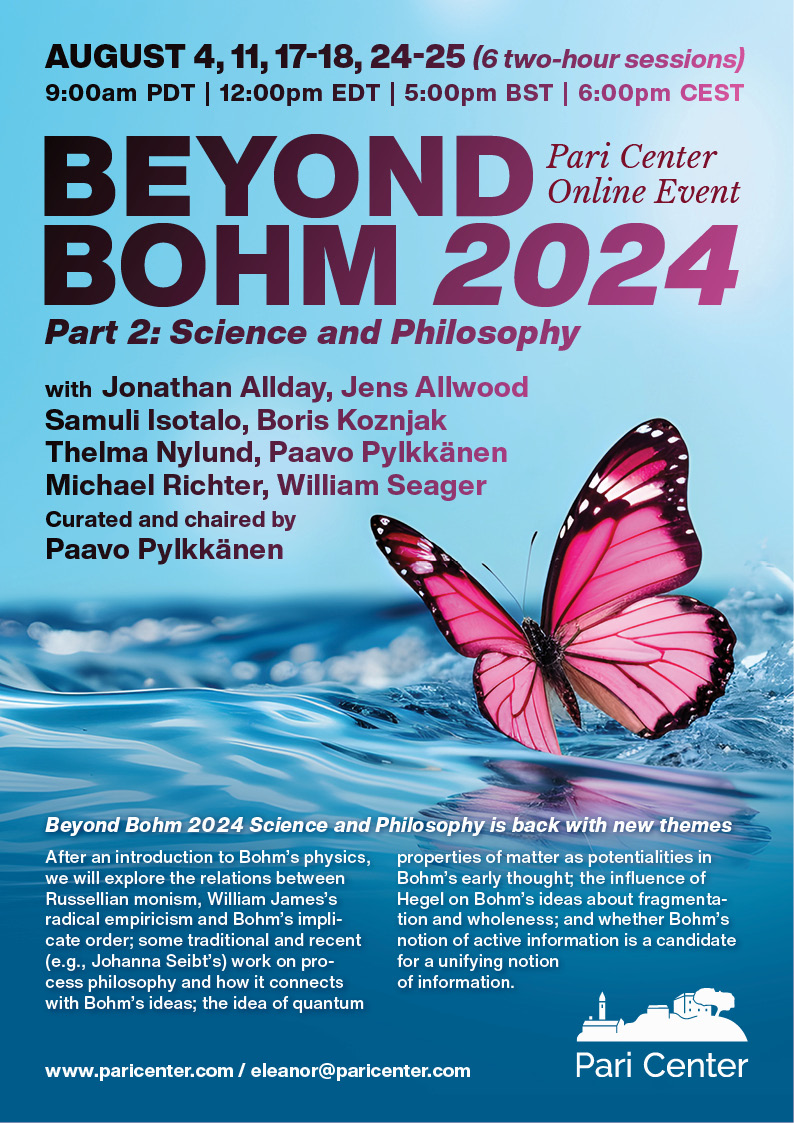Your cart is currently empty!

Beyond Bohm 2024, Part 2 – Quantum Properties of Matter as Potentialities in Bohm’s 1951 Book Quantum Theory
- This event has passed.
August 18, 2024 @ 6:00 pm – 7:30 pm CEST

76 people are attending Beyond Bohm 2024, Part 2 – Quantum Properties of Matter as Potentialities in Bohm’s 1951 Book Quantum Theory
Quantum Properties of Matter as Potentialities in Bohm’s 1951 Book Quantum Theory
with Paavo Pylkkänen
Sunday August 18
9:00am PDT | 12:00pm EDT | 5:00pm BST | 6:00pm CEST
2-hour session.
The session is live and you will be sent the RECORDING.
One year before his 1952 ‘hidden variables’ paper David Bohm presented a physical-ontological interpretation of standard (‘Copenhagen’) interpretation of quantum theory in his 1951 646-page textbook. He proposed that properties of quantum particles such as electrons ought to be seen as ‘opposing potentialities.’ They are ‘potentialities’ in the sense they typically do not exist in a well-defined sense before measurement and ‘opposing’ in the sense that if one measures, say, position accurately, one cannot measure momentum accurately at the same time in the same experimental situation (‘complementarity’). Bohm’s discussion is philosophically intriguing—for one thing he suggests that we cannot derive the macroscopic world (which we need to actualize the potentialities of quantum particles) from quantum theory. And yet the behaviour of the macroscopic, classical level can only be understood in terms of a quantum theory of its component molecules. Bohm’s discussion anticipates the implicate order framework, where he introduces the notion of an ‘intrinsically implicate order,’ which means an order all of which cannot be made ‘explicate’ at a given moment. In this sense Bohm’s 1951 electron (conceived of as consisting of opposing potentialites) is an intrinsically implicate order, as we cannot manifest position and momentum at the single moment of time. The relation of the macroscopic world to the underlying quantum level of reality continues to be a subject of philosophical discussion, as we still cannot experimentally distinguish between, say, many worlds, pilot wave or spontaneuous collapse interpretations. I will argue that Bohm’s 1951 discussion still provides a valuable perspective to the meaning of quantum theory.

Paavo Pylkkänen, PhD, is Senior Lecturer in Theoretical Philosophy and Director of the Bachelor’s Program in Philosophy at the University of Helsinki, Finland. He is also Associate Professor of Theoretical Philosophy (currently on leave) at the Department of Cognitive Neuroscience and Philosophy, University of Skövde, Sweden, where he initiated a Consciousness Studies Programme. His main research areas are philosophy of mind, philosophy of physics and their intersection. In his book Mind, Matter and the Implicate Order (Springer) he proposed that new notions emerging from quantum physics (especially Bohm and Hiley’s interpretation) provide new ways of approaching key problems in philosophy of mind, such as mental causation and time consciousness. In 2018-2020 working as the Vice Dean of Research at the Faculty of Arts he had the main responsibility for developing the new profiling area Mind and Matter for the University of Helsinki
https://www2.helsinki.fi/en/mind-and-matter.
Paavo Pylkkänen has been a visiting researcher in Stanford University, Oxford University, London University, Charles University Prague and Gothenburg University and was a member of the Academy of Finland Center of Excellence in the Philosophy of Social Sciences (TINT).
https://researchportal.helsinki.fi/en/persons/paavo-pylkkänen/publications/
Who's coming?
76 people are attending Beyond Bohm 2024, Part 2 – Quantum Properties of Matter as Potentialities in Bohm’s 1951 Book Quantum Theory
